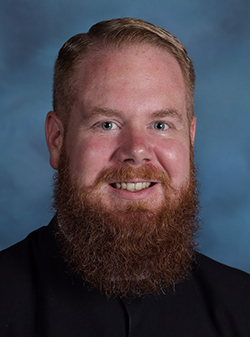 CarterCHARLOTTE — The Rite of Christian Initiation of Adults (RCIA), the process for people to learn about the Catholic faith and join the Church, has been a staple in Catholic life and lingo for years. Now, the process is getting renamed and revamped.
CarterCHARLOTTE — The Rite of Christian Initiation of Adults (RCIA), the process for people to learn about the Catholic faith and join the Church, has been a staple in Catholic life and lingo for years. Now, the process is getting renamed and revamped.
In 2021, the U.S. bishops changed the name of one of the Church’s best-known acronyms, reorienting the Rite of Christian Initiation of Adults into the new Order of Christian Initiation of Adults, or OCIA for short. The name change and the new approach that it represents are now in the process of being implemented in the
Diocese of Charlotte and across the country. (The Spanish-language version will retain its acronym of RICA, for Ritual de la Iniciacion Cristiana de Adultos.)
The changes took effect Dec. 1, 2024, with parishes shifting to their mandatory use by Ash Wednesday, March 5.
The changes are part of a long-term, worldwide effort to improve the Church’s translation of English prayers and liturgical texts from their original Latin. For the English-speaking churches around the world, including in the United States, the Latin word “ordo” is being retranslated from the English word “rite” to “order.”
More than a word change, the move reflects a deeper meaning, explains Father Noah Carter, director of the diocese’s Divine Worship Office.
The process by which people convert to Catholicism encompasses a spiritual journey that involves the Holy Spirit, not only liturgical actions or prayers (that is, a rite), he said. “The focus shifts to less upon what they know and more on their ability to conform their lives to the teachings of the Church.”
“The order contains the rites, but it is more than just the rites,” he said. The word “order” reflects the more profound spirituality and sacramental nature of the activity, similar to “Order of Matrimony” and “Order of the Mass.”
The new structure of OCIA goes further than RCIA, as well, Father Carter said. It is meant to invite candidates and catechumens into a continuous process of spiritual formation as opposed to emphasizing fixed checkpoints on a path to joining the Church and receiving the sacraments of baptism, first Holy Communion and confirmation.
That is reflected in a change to the length, breadth and timing of the process by which someone is initiated into the Church, he said.
“It’s no longer allowed that catechumens can come into the process and be baptized and receive the sacrament at next Easter Vigil – it will be a longer process,” he said. “Some parishes practice an academic year program in which from September through June, they’ll have, say, Tuesday night classes, and if you joined early enough, you would be initiated at the Easter Vigil.
Now, it will be a year-round process (with more flexibility for entering the Church at different times). All of those who are seeking initiation are meeting on a regular basis, studying the Word of
God as proclaimed in Scripture and learning the teachings of the Church.”
The revised order also emphasizes the practice of corporal and spiritual works of mercy throughout the formation process.
Aside from the name change and clarification of the names given to groups of people going through the process, Father Carter said, “the biggest changes that the ordinary member of the congregation will see are different prayers,” based on the new English translations.
Bishop Michael Martin promulgated local norms for the statutes on Dec. 10, 2024, and parishes are in the process of implementing the changes in coordination with the Divine Worship Office, Father Carter said.
— Catholic News Herald. Catholic News Service and OSV contributed.


